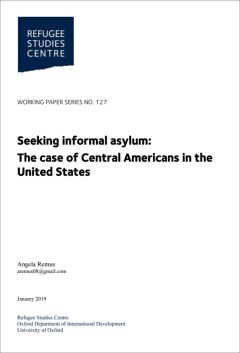Seeking informal asylum: The case of Central Americans in the United States
Angela Remus

This paper uses the example of Central Americans from the Northern Triangle living in the United States as an illustration of the decisions of refugees to forego formal asylum in favour of irregular status. The question at the centre of this paper is: how might we understand the decisions of refugees to opt out of formal asylum systems? I argue that, for many refugees, ‘informal asylum’ outside of state recognition is preferable to entering the formal asylum system. In particular, I suggest that when the restrictiveness of the asylum system is high and the conditions of life outside the state are manageable, a refugee may strategically opt out of the formal asylum system, realising a kind of informal asylum instead. I use the situation of immigrants from the Northern Triangle living in the United States to illustrate this argument, highlighting the case for viewing Central Americans as presumptive refugees, the factors that deter recourse to formal asylum, and the features that make undocumented life in the United States possible. This paper does not offer conclusive evidence for the salience of various factors in immigrants’ decisions to forego formal asylum; it does, however, provide a framework through which to challenge existing assumptions about the desirability of the state’s offer of asylum and the nature of undocumented residence in the state, ultimately illustrating the plausibility of the notion of ‘informal asylum’.
